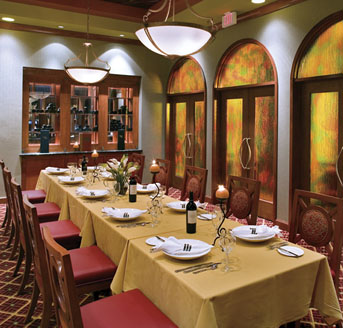 When one investigates the impermanent practice of occupying a restaurant table, distressing logistics begin to emerge.
When one investigates the impermanent practice of occupying a restaurant table, distressing logistics begin to emerge.
Let us assume that the customer waits four months for a reservation at a fancy restaurant. Let us also assume that the dining experience extends to a generous two hours. The customer waits 120 days, or 2,880 hours, to lodge at a table for one twelfth of a day. The hotel offers free towels. The restaurant offers free napkins, with the waiter sometimes placing the napkin upon the customer’s lap. (One wonders whether some innovator in the hotel industry will extend this practice to those emerging out of a foggy hotel room bathroom in the buff.) The hotel may offer a mint under a pillow, thereby associating the breath cleanser with sleep. The restaurant may offer a mint with the bill, thereby associating the breath cleanser with money. Depending upon your ideological position, one might be said to be inferior to the other. But the restaurant customer isn’t presented with the option of lingering for additional hours or, in the most generous cases, staying over for a few days — as he sometimes is when having dinner at a friend’s house.
Thus, long-term hospitality is compartmentalized into these strange slivers of time, and the process of waiting for a restaurant table is incommensurate with other proud American activities. Compared against the restaurant reservation, a gun would arrive swifter even after the most rigorous background check. Government bureaucracy, with its slow and circuitous crawl, can handily defeat the restaurant in a race to the finish. One could read an author’s complete works faster. And if one were to adopt the combined qualities of ambition and charisma, one might make love with enough souls to pack three restaurants.
These observations are not intended to impugn either the customer or the good people who work at restaurants. All are victims of a rather silly system. What remains so interesting about all this is that nobody has thought to present an alternative.
Compared to the small-time bribery of tipping a barista and buying a beverage every few hours to secure a rented perch at a wi-fi cafe, the fancy restaurant, in most cases, wants to evict the customer and make the customer wait in the reservation queue for a second appearance. But if the restaurant is extraordinary, should not this experience extend beyond this narrow limit? Or is the experience “extraordinary” because the customer is happily parting with his money? Is it “extraordinary” because the cook is tight-lipped about his recipe? Because the kitchen is cordoned off from the dining room? Because the customer does not bring a side dish or a bottle of wine to a friend’s dining room table?
Even if the restaurant is not fancy, the customer, should he wish to pay the bill and retire, may stay suspended in the post-meal sitting state for quite some time. And there is the additional ethical problem of the customer viewing the waiter as a second-class citizen. The waiter, presenting the customer with an illusion that he is agreeable and nonjudgmental, performs any number of gestures and utters any number of false flatteries to earn his tip. The waiter is addressed not because he is a lively and interesting soul (although many waiters are), but because he is there in obeisance to the customer’s wishes. Small wonder that the fancy restaurant reservation has become a pain in the ass, for so many customers are asses to these needlessly overlooked soldiers.
How did such an experience emerge? Rebecca L. Spang’s The Invention of the Restaurant informs us quite helpfully that restaurants emerged after the French Revolution, the byproduct of breaking catering guilds. The restaurant was happily promulgated through free trade propaganda. An entrepreneur named Mathurian Roze de Chantoiseau, running an information office, thought to tap into the gustatory instinct. He made the need to celebrate social occasions and human togetherness with meals more flexible, tying this burgeoning luxury into an expansive market. Critics complained about the restaurant’s assaults on person-to-person generosity, but Roze de Chantoiseau declared himself a “friend of the world.” Indeed, the restaurant service sector, which has continued to flourish for so many centuries, has proven to be a vocational boon for many. Eaters were “restored” through the practice of sitting at a table. But with “restoration” aligned so closely with the transaction of money, one wonders why more people have welcomed the the restaurant’s rigid class system rather than an uptick in more egalitarian dinner parties. Surely, the restaurant should be rightly renamed bourgeoisant.
The time has come for reform. Let those who cannot find the impulse to cook wait upon the waiters. Since the restaurant initially provided services for travelers, let us return to the original intent. Restaurant regulars have been identified as wispy-eyed figures who live just around the block, but these indolent customers cannot be said to have truly traveled. Thus, restaurants must be enlisted to ask for IDs, verifying the number of miles that the customer has traveled to get to the restaurant. This suggestion may also solve certain insular qualities of Americans. (Just 20% of Americans have passports. Let faraway restaurants encourage these isolationists to spread their wings!) Let us adjust restaurants so that they more resemble their hotel cousins. Red zodiac booths might be transformed into strange beds. The head, encountering Formica rather than a fluffy pillow, would adjust to the instant discomfort.
These remedies will likely be identified by some reactionary minds as madness. But it’s more than a little mad to contend with the dining experience’s needless complications when one might have a more effective restoration among friends at a dining room table.
